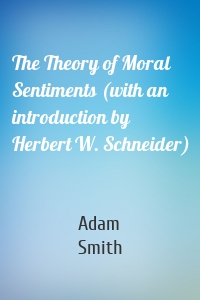Adam Smith
35 кн.
The Theory of Moral Sentiments
Written in 1759 by Scottish philosopher and political economist Adam Smith, “The Theory of Moral Sentiments” provides much of the foundation for the ideas in his later works, most notably in “The Wealth of Nations.” Through this initial text, Smith expresses his general system of morals, exploring the propriety of action, reward and punishment, sense of duty, and the effect of numerous factors on moral sentiment. In so doing, Smith devised innovative theories on virtues, conscience, and moral...
| Автор | Adam Smith |
The Theory of Moral Sentiments
The foundation for a general system of morals, this 1749 work is a landmark in the history of moral and political thought. Readers familiar with Adam Smith from The Wealth of Nations will find this earlier book a revelation. Although the author is often misrepresented as a calculating rationalist who advises the pursuit of self-interest in the marketplace, regardless of the human cost, he was also interested in the human capacity for benevolence — as The Theory of Moral Sentiments...
| Автор | Adam Smith |
Wealth of Nations
Contains Active Table of Contents (HTML) and in the end of book include a bonus link to the free audiobook. Adam Smith's masterpiece, first published in 1776, is the foundation of modern economic thought and remains the single most important account of the rise of, and the principles behind, modern capitalism. Written in clear and incisive prose, The Wealth of Nations articulates the concepts indispensable to an understanding of contemporary society.
| Автор | Adam Smith |
The Theory of Moral Sentiments
Written in 1759 by Scottish philosopher and political economist Adam Smith, «The Theory of Moral Sentiments» provides much of the foundation for the ideas in his later works, most notably in «The Wealth of Nations.» Through this initial text, Smith expresses his general system of morals, exploring the propriety of action, reward and punishment, sense of duty, and the effect of numerous factors on moral sentiment. In so doing, Smith devised innovative theories on virtues, conscience, and moral...
| Автор | Adam Smith |
The Theory of Moral Sentiments (wit...
Written in 1759 by Scottish philosopher and political economist Adam Smith, “The Theory of Moral Sentiments” provides much of the foundation for the ideas in his later works, most notably in “The Wealth of Nations.” Through this initial text, Smith expresses his general system of morals, exploring the propriety of action, reward and punishment, sense of duty, and the effect of numerous factors on moral sentiment. In so doing, Smith devised innovative theories on virtues, conscience, and moral...
| Автор | Adam Smith |
The Wealth of Nations
The foundation for all modern economic thought and political economy, «The Wealth of Nations» is the magnum opus of Scottish economist Adam Smith, who introduces the world to the very idea of economics and capitalism in the modern sense of the words. Smith details his argument in the following five books: Book I. Of the Causes of Improvement in the productive Power of Labour, Book II. Of the Nature, Accumulation, and Employment of Stock Introduction, Book III. Of the Different Progress of...
| Автор | Adam Smith |
The Wealth of Nations
The Wealth of Nations is the magnum opus of the Scottish economist and moral philosopher Adam Smith. The book offers one of the world's first collected descriptions of what builds nations' wealth, and is today a fundamental work in classical economics. By reflecting upon the economics at the beginning of the Industrial Revolution, the book touches upon such broad topics as the division of labor, productivity, and free markets. The Wealth of Nations was the product of seventeen years of...
| Автор | Adam Smith |

























